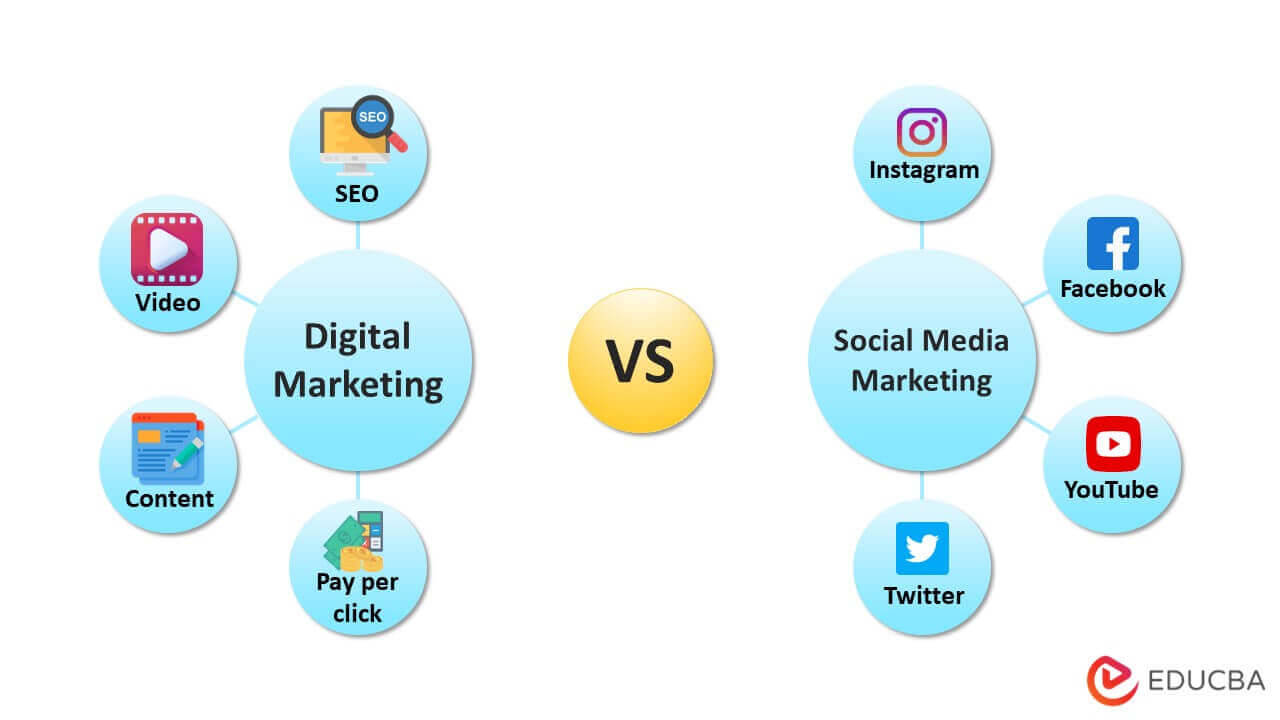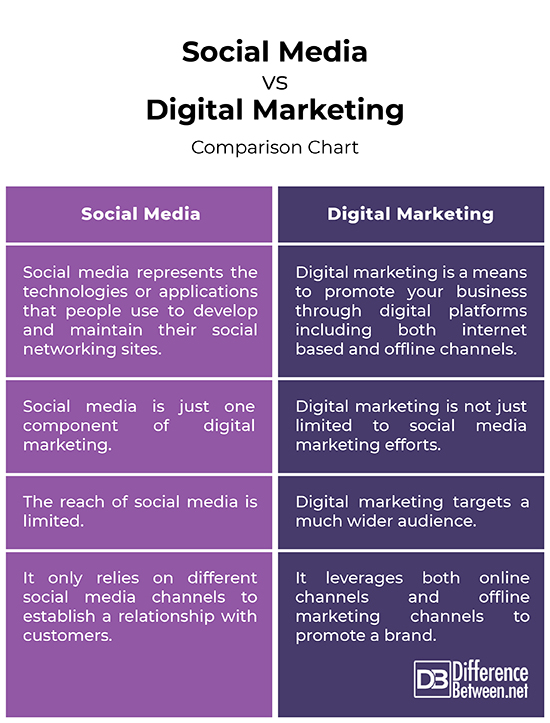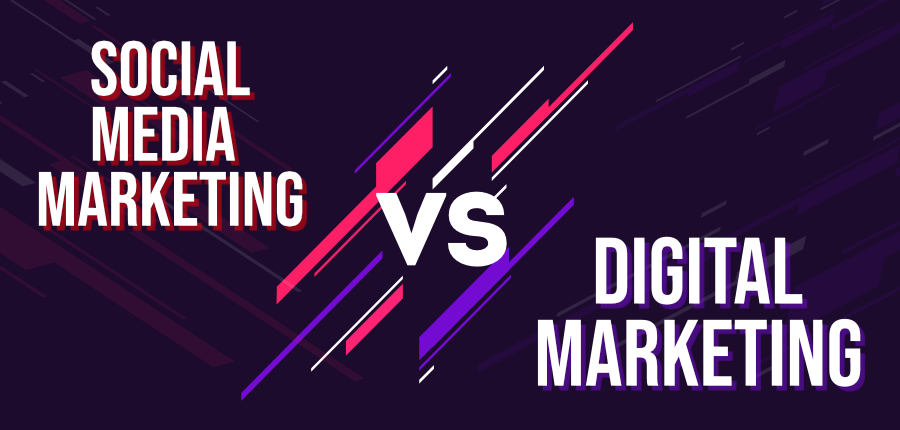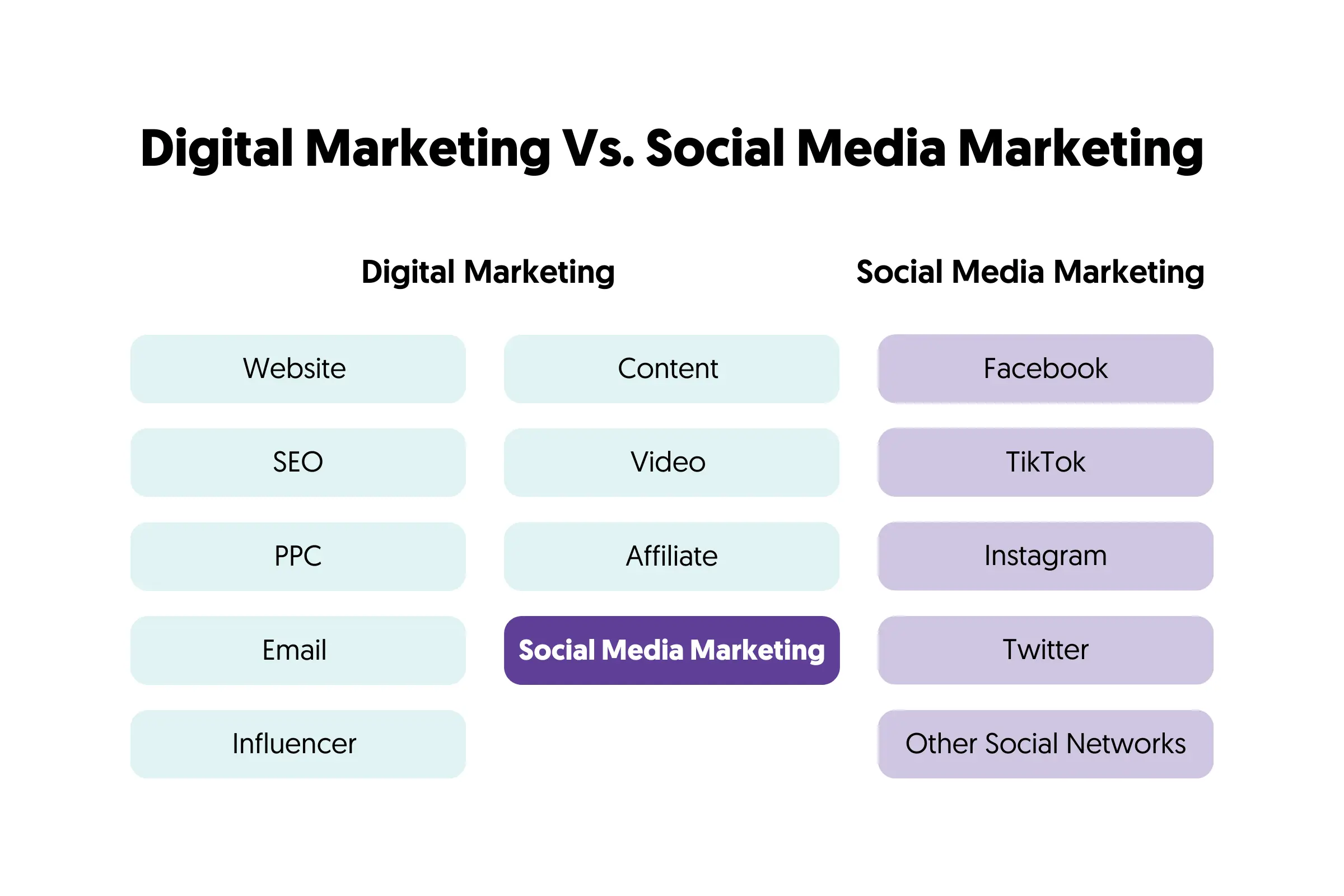What is the Difference between Digital Marketing And Social Media Marketing
Digital Marketing encompasses a broad range of online marketing activities, while Social Media Marketing specifically focuses on marketing through social media platforms. Understanding the distinction between Digital Marketing and Social Media Marketing is essential for businesses aiming to harness the internet for brand growth. Digital marketing is a vast field…
Digital Marketing encompasses a broad range of online marketing activities, while Social Media Marketing specifically focuses on marketing through social media platforms. Understanding the distinction between Digital Marketing and Social Media Marketing is essential for businesses aiming to harness the internet for brand growth.
Digital marketing is a vast field that includes search engine optimization (SEO), pay-per-click advertising (PPC), email marketing, content marketing, and more. It leverages various channels to connect with potential customers. On the other hand, Social Media Marketing zeroes in on platforms like Facebook, Twitter, Instagram, and LinkedIn for brand promotion, customer engagement, and audience building.
By narrowing its focus, Social Media Marketing can intensify brand presence where it interacts most effectively with its audience. For a comprehensive online strategy, companies often blend broad digital practices with the targeted approach of social media.

Credit: www.educba.com
Digital Marketing Demystified
Entering the world of digital marketing can often seem like walking through a maze of buzzwords and complex strategies. But fear not! Digital Marketing Demystified unravels this web, showcasing the full breadth of opportunities lying beyond the common notion of social media marketing.
The Roots And Rise Of Digital Marketing
Digital marketing is an umbrella term. It covers all marketing efforts that use an electronic device or the internet. The roots of digital marketing lie in the invention of the first search engines and websites. As technology grew, so did the methods to reach consumers online. Early digital marketing involved email blasts and static webpages, but today’s landscape is much more complex and dynamic.
Scope And Channels Beyond Social Media
While social media marketing is a key component, digital marketing sprouts branches in many directions. The scope extends to channels such as:
- Search Engine Optimization (SEO): Optimizing content to rank high on search engine results pages.
- Pay-Per-Click (PPC) Advertising: Paid ads that appear alongside search results or on websites.
- Email Marketing: Sending targeted messages to predefined audiences
- Content Marketing: Creating and sharing valuable content to attract and convert prospects into customers.
- Affiliate Marketing: Partnering with other businesses to exchange commissions for conversions.
- Influencer Marketing: Collaborating with influential people to promote products or services.
- Mobile Marketing: Reaching audiences through smartphones and mobile devices.
This rich tapestry of tactics makes up the diverse field of digital marketing. It is clear that digital marketing encompasses a vast digital landscape, while social media marketing is just one part of the whole picture.
Social Media Marketing Spotlight
Social Media Marketing Spotlight shines on the strategic ways brands interact with people online. It differs from broader digital marketing. Social media marketing focuses on platforms like Facebook, Twitter, and Instagram. Here, brands create a space to foster community and engagement directly with their audiences.
Social Networks As Marketing Platforms
Social networks serve as powerful marketing tools. Brands use these platforms to reach potential customers. Here’s why they stand out:
- Vast audiences: Millions of users are active daily.
- Targeting options: Marketers can target users by interests, demographics, and more.
- Brand personality: Companies showcase their brand’s voice and personality.
Engagement And Community Building
Engagement and community are the hearts of social media marketing. This means more than just posting content. It’s about creating conversations and relationships.
| Strategy | Benefits |
|---|---|
| Interactive Content | Increases user interaction and time spent on page. |
| User-Generated Content | Builds community trust and showcases real-life product uses. |
| Responsive Communication | Makes users feel heard and valued, fostering brand loyalty. |
Scope And Strategies
Understanding the scope and strategies of digital marketing versus social media marketing is key. This helps businesses craft plans to reach more customers.
Digital Marketing: A Multi-faceted Approach
Digital marketing covers a wide range. It includes many online tactics and channels. Businesses use these to connect with customers. Here’s a glimpse:
- SEO (Search Engine Optimization): Optimizes content to rank higher in search results.
- SEM (Search Engine Marketing): Involves paid ads to increase visibility.
- Email campaigns: Sends direct promotional messages to people.
- Content marketing: Uses blogs, videos, and podcasts to engage audiences.
These strategies help brands reach different goals. They can drive website traffic, generate leads, or boost sales online.
Social Media Marketing: Niche Targeting And Interaction
In social media marketing, the focus narrows. It is all about platforms like Facebook, Twitter, and Instagram. Here, strategies often include:
- Creative content: Posts and stories that catch the eye.
- Community building: Groups and chats for customer interaction.
- Influencer partnerships: Collaborations to reach specific groups.
- Social listening: Tracking and responding to customer feedback.
This niche targeting helps create a strong bond with audiences. It also allows for real-time engagement and customer service.
Tools Of The Trade
The right tools can make all the difference in the accessibility and effectiveness of digital and social media marketing. These tools help businesses track performance, engage with audiences, and streamline campaigns. Let’s explore the tools that are essentials in every digital marketer’s toolkit.
Analytical And Automation Tools For Digital Marketing
Digital marketing thrives on data and efficiency. The following tools are vital:
- Google Analytics: Tracks website activity and user behavior.
- SEMrush: Offers keyword research, SEO audits, and competitor analysis.
- HubSpot: Provides marketing automation and customer relationship management.
- Hootsuite: Allows scheduling and analytics across multiple platforms.
These tools help translate data into actionable insights and save time with automation.
Social Media-specific Tools For Marketers
To excel in social media marketing, these specialized tools are indispensable:
| Tool | Functionality |
|---|---|
| Canva: | Designs eye-catching social media graphics. |
| Buffer: | Schedules posts and provides analytics. |
| Sprout Social: | Manages and analyzes social interactions. |
| Brand24: | Monitors brand mentions and sentiments. |
Each tool ensures that social media strategy aligns with audience preferences and engagement patterns.
Marketing Goals And Outcomes
Understanding Marketing Goals and Outcomes is crucial for businesses. Different strategies serve different purposes. Choosing the right approach varies based on desired results. This section explores the specific goals linked to Digital Marketing and Social Media Campaigns.
Broad Objectives Of Digital Marketing
Digital Marketing is a large umbrella term. It includes many channels and tactics. Businesses use it to reach vast audiences. Key objectives include:
- Increasing website traffic: More visitors lead to more potential customers.
- Boosting brand awareness: Making more people know your brand.
- Generating leads: Collecting information from interested users.
- Improving conversion rates: Turning visitors into buyers.
- Maximizing ROI: Getting the best results from the money you spend.
Specific Aims Of Social Media Campaigns
Social Media Campaigns focus on platforms like Facebook and Twitter. These campaigns intend more specific outcomes. For instance:
- Engaging with your audience: Building a community around your brand.
- Sharing content: Spreading your message quickly.
- Gathering customer feedback: Learning what your customers think.
- Running targeted ads: Reaching the right people with ads.
Both strategies work towards the ultimate goal of business growth. Yet, they vary in tools and methods. Thus, knowing these differences helps in crafting effective marketing plans.

Credit: www.differencebetween.net
Success Metrics Difference
Understanding how to measure success is key in marketing. Digital marketing and social media marketing have distinct metrics for tracking performance. Learning to read these metrics can help you hone your strategies and boost your return on investment (ROI).
Measuring Digital Marketing Roi
In digital marketing, ROI tells you if your campaigns are profitable. The focus is on-
- Conversion rates: The percentage of visitors who perform desired actions.
- Cost per lead: The cost for each potential customer.
- Customer lifetime value: The total worth of a customer over time.
A good ROI means your digital marketing efforts are working well.
Understanding Social Media Metrics
Social media success goes beyond sales. Key metrics include-
- Engagement: Likes, comments, and shares.
- Reach: The number of people seeing your content.
- Followers growth: How fast your audience is growing.
Strong social media metrics lead to brand awareness and loyalty.
Integration And Synergy
Understanding Integration and Synergy between different marketing strategies ensures optimized outreach and engagement. Knowing when and where to apply digital marketing and social media marketing techniques can distinguish between a good campaign and a great one. Both have distinct roles but share a common goal: maximizing brand visibility and connectivity with the audience.
Blending Digital And Social Media Efforts
Successfully blending digital and social media efforts is like creating a perfect recipe. Each ingredient must complement the others. Your brand’s online presence grows stronger by integrating SEO, email marketing, content creation, and social media interactions. Here’s how to mix them:
- SEO: Use the right keywords to drive traffic from search engines to your social media.
- Email Marketing: Share your social media content in newsletters.
- Content Creation: Post blogs that link back to your social channels.
- Social Interactions: Engage with followers and direct them to your website.
Holistic Marketing Campaigns For Brand Success
A holistic marketing campaign recognizes the importance of every marketing facet.
It aligns:
- Digital tools (like analytics)
- Social platforms (like Instagram)
- Content strategies (like storytelling)
This alignment ensures that each channel supports the others for unified brand messaging. It’s not just about promotion. It’s about creating a consistent, compelling narrative that resonates across all mediums. Implementing a holistic approach leads to:
| Increased Engagement | Brand Consistency | Efficient Resource Use |
|---|---|---|
| More shared content | Unified messaging | Optimal spending |

Credit: www.geeksforgeeks.org
Real-world Examples And Case Studies
Exploring the digital landscape through stories and strategies provides insights into the effective use of digital and social media marketing. Real-world examples and case studies serve as guides, shining a spotlight on the successes and innovative approaches brands have used to reach new heights.
Success Stories From Digital Marketing
Digital marketing campaigns have driven remarkable growth for businesses. Below are success stories showcasing how varied strategies can yield substantial results.
- SEO Masterstroke: A clothing retailer increased organic traffic by 200% in one year using high-quality content and strong keyword strategies, leading to a 150% rise in online sales.
- Email Marketing Excellence: A food delivery service, by segmenting their audience and personalizing emails, witnessed a 40% uptick in customer engagement.
- PPC Campaign Triumph: An electronics company’s click-through rate soared by 70% after refining their PPC campaigns, targeting user intent, and optimizing ad copies.
Winning Strategies In Social Media Marketing
Adept use of social media platforms has enabled brands to forge stronger connections with their audiences. Below are case studies demonstrating successful social media tactics.
- Influencer Collaboration: A beauty brand partnered with mid-tier influencers, resulting in a 30% boost in product awareness and a spike in sales.
- Interactive Content: A gaming company used polls and quizzes on social platforms to engage users, leading to an increased retention rate and higher app installs.
- User-Generated Content: An adventure travel agency featured customers’ trip photos, which led to a 50% increase in social shares and a surge in bookings.
Navigating Challenges In Marketing
The realm of marketing presents a dynamic landscape, with every brand striving to secure its presence and engage its audience effectively. Navigating through the maze of strategies requires an agile approach and an understanding of the distinct platforms and tools at our disposal. Below, we dive into the core challenges marketers face in the digital and social media arenas and explore ways to tackle them.
Adapting To Digital Marketing Trends And Changes
Digital marketing constantly evolves, with new technologies shaping how brands connect with consumers. Staying ahead demands flexibility and the ability to learn quickly. Brands must:
- Analyze emerging trends to forecast shifts in consumer behavior.
- Invest in tools that enhance data-driven decision-making.
- Create diverse content that adapts to various digital channels.
- Test campaigns frequently to fine-tune messages for target audiences.
Such measures ensure brands remain relevant in a competitive digital space.
Overcoming Hurdles In Social Media Engagement
Engagement on social media platforms can be challenging. Brands face a battle for attention amidst a sea of content. Effective strategies include:
- Understanding platform algorithms to optimize post visibility.
- Building a community by interacting with followers regularly.
- Creating shareable content to drive organic user interactions.
- Utilizing analytics to refine social media strategies.
These steps help maintain a vibrant presence on social media, fostering trust and loyalty among the user base.
Future Landscape And Predictions
The digital landscape constantly evolves, impacting how brands connect with consumers. As we look to the future, changes in technology and consumer behavior will shape the direction of digital and social media marketing. Here’s a glimpse into what we can expect as we navigate the dynamic world of online marketing.
Evolving Digital Marketing Ecosystem
The digital marketing ecosystem is set for dramatic shifts. Emerging technologies will play a central role. Artificial Intelligence (AI) and Machine Learning (ML) are already making headway. They personalize user experiences at scale. They do this with unprecedented efficiency and accuracy. Voice search optimization also gains traction, with smart speakers and virtual assistants becoming household staples. Another aspect is the integration of Augmented Reality (AR) in marketing campaigns, providing interactive and immersive experiences.
- AI and ML tailor content in real-time
- Voice search creates opportunities for keyword evolution
- AR bridges the gap between digital and physical realms
The Next Wave Of Social Media Marketing Innovations
As social media platforms grow, new features emerge. These features change how brands engage with audiences. The future promises more sophisticated tools. We will see advanced analytics and algorithm-driven content curation. This will help brands better understand and target their audiences. Influencer marketing is set to become even more nuanced, with micro-influencers gaining more traction due to their highly engaged niches. The rise of social commerce is another trend, allowing for seamless in-app purchases and a smoother buyer journey.
- Analytics will drive deeper consumer insights
- Micro-influencers will bolster brand authenticity
- Social commerce simplifies the path to purchase
As we steer through the ever-changing digital waters, both digital and social media marketing are heading towards more personalized, data-driven strategies that prioritize user experience above all.
Frequently Asked Questions On What Is The Difference Between Digital Marketing And Social Media Marketing
What Is Digital Marketing?
Digital marketing refers to a broad range of marketing activities that use digital channels to promote products or services. This includes SEO, PPC, email marketing, and more. It encompasses all online marketing efforts.
How Does Social Media Marketing Fit In?
Social media marketing is a subset of digital marketing. It specifically involves using social media platforms like Facebook, Twitter, and Instagram to market a product or service, engage with customers, and build brand awareness.
Are Both Necessary For Businesses?
Yes, most businesses benefit from using both digital and social media marketing strategies. They complement each other and help reach a wider audience, drive engagement, and increase conversions.
How Do They Drive Traffic Differently?
Digital marketing drives traffic through various channels, including search engines, emails, and paid ads. Social media marketing attracts traffic primarily through content sharing and user engagement on social platforms.
Conclusion
Wrapping up, digital marketing and social media marketing are pivotal in modern businesses. Each strategy serves unique purposes but can overlap in goals and techniques. Remember, digital marketing is the broader canvas, while social media marketing is an intricate brushstroke on it.
Choose wisely to harness their collective power for your brand’s success. Embrace both and watch your enterprise thrive.







